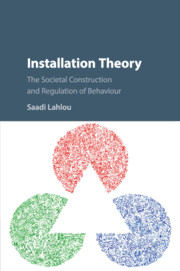Book contents
- Installation Theory
- Installation Theory
- Copyright page
- Dedication
- Contents
- Figures
- Plates
- Foreword
- Acknowledgements
- Introduction
- Chapter 1 Installation
- Chapter 2 The Problem of Human Action and the Problem of Social Regulation
- Chapter 3 Theoretical Frameworks Grounding Installation Theory
- Chapter 4 The Structure of Installations
- Chapter 5 Endurance of Installations
- Chapter 6 Selection Mechanisms in Societal Evolution
- Chapter 7 The Evolution of Installations
- Chapter 8 Redesigning Installations to Change Behaviour
- Chapter 9 Conclusion
- Glossary
- References
- Index
Chapter 1 - Installation
A Synthetic Theory to Explain How Humans Construct Systems That Support and Format Individual Behaviour
Published online by Cambridge University Press: 28 December 2017
- Installation Theory
- Installation Theory
- Copyright page
- Dedication
- Contents
- Figures
- Plates
- Foreword
- Acknowledgements
- Introduction
- Chapter 1 Installation
- Chapter 2 The Problem of Human Action and the Problem of Social Regulation
- Chapter 3 Theoretical Frameworks Grounding Installation Theory
- Chapter 4 The Structure of Installations
- Chapter 5 Endurance of Installations
- Chapter 6 Selection Mechanisms in Societal Evolution
- Chapter 7 The Evolution of Installations
- Chapter 8 Redesigning Installations to Change Behaviour
- Chapter 9 Conclusion
- Glossary
- References
- Index
Summary
This book addresses the question of how societies empower and control individuals to behave in a ‘correct’ way.
It describes installations in which, even though they are creatures of free will, humans are induced to behave in an overall predictable and standardized manner. Restaurants, escalators, shoe shops, cinemas, family dinners, basketball matches, toilets, voting booths, intensive care units and open-plan offices are some examples of installations. They have a momentum of their own. They elicit, frame, channel and control individual behaviour. The chapters show how to analyse installations, how they work, how they are constructed, how they evolve and how to change them.
Installations have been partly described in social science under various names: behavioural settings, ‘dispositif’, frame, etc. Installation theory is their first systematic analysis from the pragmatic perspective of design and intervention.
The book provides a simple and robust framework, grounded in extensive empirical analyses of real cases.
This first chapter introduces the problem with some simple examples (air travel, road traffic). It then clarifies our research questions (how humans manage to accomplish complex tasks in society, how social regulation is implemented in practice). It also provides an overview of the book’s content and an outline of each chapter.
Information
- Type
- Chapter
- Information
- Installation TheoryThe Societal Construction and Regulation of Behaviour, pp. 1 - 20Publisher: Cambridge University PressPrint publication year: 2018
